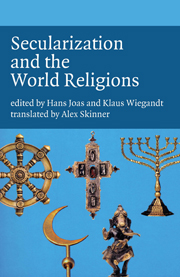Book contents
- Frontmatter
- Contents
- Notes on Contributors
- Foreword
- Society, State and Religion: Their Relationship from the Perspective of the World Religions: An Introduction
- 1 Catholic Christianity
- 2 Protestantism
- 3 The Departure and Return of God: Secularization and Theologization in Judaism
- 4 Islam and Secularization
- 5 Hinduism
- 6 Secularization: Confucianism and Buddhism
- 7 From Hostility through Recognition to Identification: State–Church Models and their Relationship to Freedom of Religion
- 8 ‘Science Doesn't Tremble’: The Secular Natural Sciences and the Modern Feeling for Life
- 9 The Religious Situation in Europe
- 10 The Religious Situation in the USA
- 11 The Religious Situation in East Asia
- 12 The Relevance of the European Model of Secularization in Latin America and Africa
- 13 The Desecularization of the Middle East Conflict: From a Conflict between States to a Conflict between Religious Communities
- Afterword
3 - The Departure and Return of God: Secularization and Theologization in Judaism
- Frontmatter
- Contents
- Notes on Contributors
- Foreword
- Society, State and Religion: Their Relationship from the Perspective of the World Religions: An Introduction
- 1 Catholic Christianity
- 2 Protestantism
- 3 The Departure and Return of God: Secularization and Theologization in Judaism
- 4 Islam and Secularization
- 5 Hinduism
- 6 Secularization: Confucianism and Buddhism
- 7 From Hostility through Recognition to Identification: State–Church Models and their Relationship to Freedom of Religion
- 8 ‘Science Doesn't Tremble’: The Secular Natural Sciences and the Modern Feeling for Life
- 9 The Religious Situation in Europe
- 10 The Religious Situation in the USA
- 11 The Religious Situation in East Asia
- 12 The Relevance of the European Model of Secularization in Latin America and Africa
- 13 The Desecularization of the Middle East Conflict: From a Conflict between States to a Conflict between Religious Communities
- Afterword
Summary
Our experience of religions is ambivalent. In Central Europe, particularly Germany, the public importance of religious communities, especially the Christian churches, seems to be declining; this appears to be the continuation of a long-term trend that is constantly invoked or regretted. In other parts of the world, we are seeing a truly astonishing revitalization of religious communities within Islam, Hinduism and Buddhism, but also Christianity, in North and South America for example. Taking one of the world religions, Judaism, as a paradigm, this chapter investigates the causes of each process, the secularization and theologization of public life, but above all the question of whether there are connections between these developments, which appear to run counter to one another. We will see that the dialectic of secularization and theologization merely involves shifts within one and the same system, which, already discernible in antiquity, are by no means a characteristic only of modernity, but which constitute a universal of religious history: processes of secularization trigger processes of theologization and vice versa. In this sense, it makes no difference whether one believes oneself a member of the descending or ascending branch of religious history, as the philosopher of religion and Protestant theologian Ernst Troeltsch put it as early as the 1920s. The questions raised here can be answered only if we correlate religion as a system of ideas with its forms of social organization in a given case.
- Type
- Chapter
- Information
- Secularization and the World Religions , pp. 77 - 107Publisher: Liverpool University PressPrint publication year: 2009



